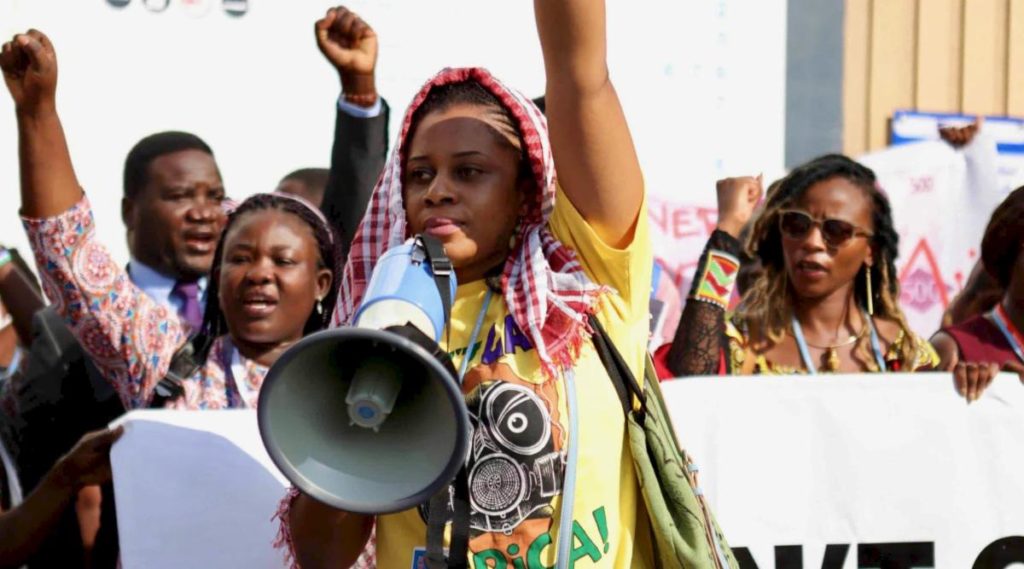Opinion: Stories From COP27

Activists holding an action at COP27 in Sharm El-Sheikh, Egypt. Photo courtesy of 350.org, used with permission.
Love, Justice And Climate Change

The nations of the world just met in Egypt at the UN climate conference, COP27, for over two weeks to try to come to agreements on addressing the global climate crisis. It was a particularly contentious conference, with agreements hard to come by, and negotiations continuing past the planned end date.
Coming into the conference the delegates found encouragement in the election of Luiz Inácio Lula da Silva in Brazil, who has pledged to eliminate the deforestation of the Amazon, and the passage of the Inflation Reduction Act in the United States, the largest climate bill ever, with billions of dollars for renewable energy. On the other hand, the urgency of the crisis has been brought into sharp focus by the flooding of one-third of Pakistan (the 5th most populous country in the world); recent flooding in Nigeria which displaced 1.4 million people; and lethal drought, famine and heat waves in many parts of the world.
“We are on a highway to climate hell with our foot still on the accelerator.”
UN Secretary-General Antonio Guterres
At the opening session of the COP, UN Secretary-General Antonio Guterres noted that global greenhouse gas emissions keep growing and that global temperatures keep rising. He said,
“We are on a highway to climate hell with our foot still on the accelerator.”UN Secretary-General Antonio Guterres
Loss And Damage
One of the key issues was “loss and damage.” Poor countries that have played virtually no role in creating the climate crisis have been experiencing tremendous loss and damage from the flooding, droughts, heat waves, and catastrophic storms caused by climate change. For years these nations have been demanding that the wealthy nations, whose emissions caused the climate crisis, pay for climate loss and damage in the developing world.
The U.S. and the E.U., historically the biggest emitters of greenhouse gases, have long resisted even putting discussions of loss and damage on the agenda for the UN climate conferences for fear that they would become subject to endless litigation. After the climate disasters of the last year, the developing nations finally succeeded in getting loss and damage on the COP27 agenda this year.
U.S. President Biden visited the conference briefly and addressed the delegates. Bill McKibben reported that as delegates streamed toward the hall were he was to speak, they all passed a crowd of activists, mostly from African and island nations, chanting, “Pay up, pay up, pay up for loss and damage.”
A Young Activist From Ghana
On the day the conference was originally scheduled to end, the U.S. was still not supporting the establishment of a loss and damage fund. Speaking to hundreds of the delegates, a 10-year-old activist from Ghana, Nakeeyat Dramani Sam, described some of the harsh effects of climate change on people in her country. She put responsibility for the climate disasters squarely on the wealthy, high-emitting nations. She noted that John Kerry and other adults had been nice to her at the conference, but then spoke frankly about the loss and damage question. “I put a simple question on the table. When can you pay us back? Because payment is overdue.“
She received a standing ovation.
The U.S. Finally Agrees
Finally, the E.U., and then the U.S., in a dramatic turnaround, agreed to creating an international loss and damage fund. One of the major accomplishments of this COP was including this fund in its final unanimous agreements. There are still many details to be worked out over the coming year or two, including who will be expected to pay into this fund, how the money will be raised, and which nations will benefit. It remains to be seen if it will be successfully implemented, but its creation is still a significant accomplishment.
“A Win For Our Entire World”
The poorer, climate-vulnerable nations of the world have been advocating for such a fund for 30 years. The fact that they finally won is a big deal–an acknowledgement that their demand is just and right. They succeeded, against all odds, in getting every one of the nearly 200 nations present to agree. The agreement is “a win for our entire world,” said Molwyn Joseph, chair of the Alliance of Small Island States.
If humanity is to have any chance of succeeding in solving the climate crisis, we will need to come together and find common cause across the divisions of wealth and race. The agreement on loss and damage has at its core an acknowledgement that some wealth must flow from the wealthy nations to the poorer ones and from predominately white nations to nations of Global Majority and Indigenous people. As inadequate and incomplete as the agreement is at this point, it makes a difference that every nation has acknowledged this.
No Progress On Reducing Emissions Or Getting Off Fossil Fuels
On the downside, COP27 failed to yield any significant new commitments to reduce greenhouse gas emissions or curb the use of fossil fuels. The world is still headed for a disastrous rise in global temperatures somewhere between a 2.1°C and 2.9°C. The goal of limiting the global temperature rise to 1.5°C was reaffirmed, although even maintaining that as a target seemed in jeopardy at one point in the conference. The U.S. did advocate strongly for keeping the 1.5°C target.
India proposed that the conference call for nations to phase down all fossil fuels (not just coal as they called for last year in Glasgow). Eighty nations, including the E.U. and the U.S., supported India’s proposal, but in the end it was not adopted, demonstrating the power that the fossil fuel industry and the petrostates still wield within the COPs. “It is more than frustrating to see overdue steps on mitigation and the phase-out of fossil energies being stonewalled by a number of large emitters and oil producers,” German Foreign Minister Annalena Baerbock said in a statement.
A Positive Development
One positive note came from the head of the Chinese delegation, Xie Zhenhua, who told reporters that China and the U.S. have renewed their partnership to address climate change. He expressed personal warmth for the U.S. envoy John Kerry and said they will continue to meet face to face after the COP. This is a big change from only a month ago.
Action Steps For Residents Of The U.S.
In the U.S. we probably won’t get a penny out of the Congress for loss and damage or any other climate funding in the next two years. But during those two years we can be about the work of building public support for the U.S. taking responsibility for the effects of our emissions on developing nations. Right now, on the heels of COP27, is a good time to talk to our neighbors and write to our political leaders and representatives urging them to support U.S funding for climate-caused loss and damage and for a global transition to renewable energy.
As the UN Secretary-General told COP27, “It is time for international solidarity across the board.”
Russ Vernon-Jones was principal of Fort River School 1990-2008 and is currently a member of the Steering Committee of Climate Action Now-Western Massachusetts. He blogs regularly on climate justice at www.russvernonjones.org.
